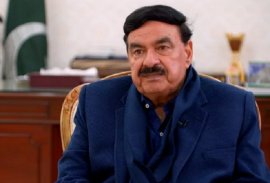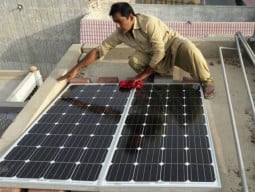
I knew that government-run schools have great flaws in the quality of education they provide, but this low-quality education was an abstract idea to me until I had first-hand experience with a student currently enrolled in one such school. My driver’s son is a student of second grade in a primary school located near Tariq Road, Karachi. Despite studying there for a couple of years, and despite his notebooks being filled with scribbling, he is unable to read or write in English beyond the basic alphabet. I found this surprising because his English notebook has plenty of exercises that use concepts like sentence-building, singular/plural and opposites. When I asked him about this, he said that his teacher just writes down the day’s work on the blackboard and asks the students to copy it without explaining it at all. For most students of his class, what they are writing is total gibberish. The situation is better, but not by much, in subjects like Urdu. He can read and write basic Urdu, but most of the work he is asked to do is nothing beyond copying entire passages from his textbook word for word, over and over again, or memorising the same questions and answers, and regurgitating them onto his notebook repeatedly.
If a student of second grade is not even taught to read and write properly, he is barely getting literate, let alone educated. There is no accountability of teachers and no overseeing body that investigates whether the students enrolled in public schools are learning anything at all. The syllabus is lifeless and monotonous, and students are not motivated to learn anything new. While Sindh’s education ministers are busy deciding whether the National Curriculum Council — a body that will set minimum standards for education in country— will have too much power, the children of Sindh are defying odds every day and going to school, only to be denied a worthwhile education.
Published in The Express Tribune, October 20th, 2014.
COMMENTS (2)
Comments are moderated and generally will be posted if they are on-topic and not abusive.
For more information, please see our Comments FAQ












































Dear Author,
Department of Education of SIndh and of Pakistan too has the highest number of Government servants serving in Grade 18 and above. The infrastructure is built very well, the budget is planned, approved and consumed very well. The number of students is really high and a few of them always reach the highest echelon of their career and society. We always quote such rare examples in the decorative speeches of highest authorities of Pakistan. Now coming to Private sector, I got high school education in a institution ran for no profit and no loss bases administration, no commercial interest was there and from a class of forty students I can quote there are twelve Engineers and three docs.Now a days we have many big names in education running for commercial interest of the owners. The cheap education system of Madarasa has spoiled the culture and we are having juvenile bombers. A quote by an English Men " Cheap education is very costly".
Thanks for your input and a nice article.
Abid Raza.
and wiki says Pakistan is the third country after US and India where 49% population speaks English. I got shocked by such figures!